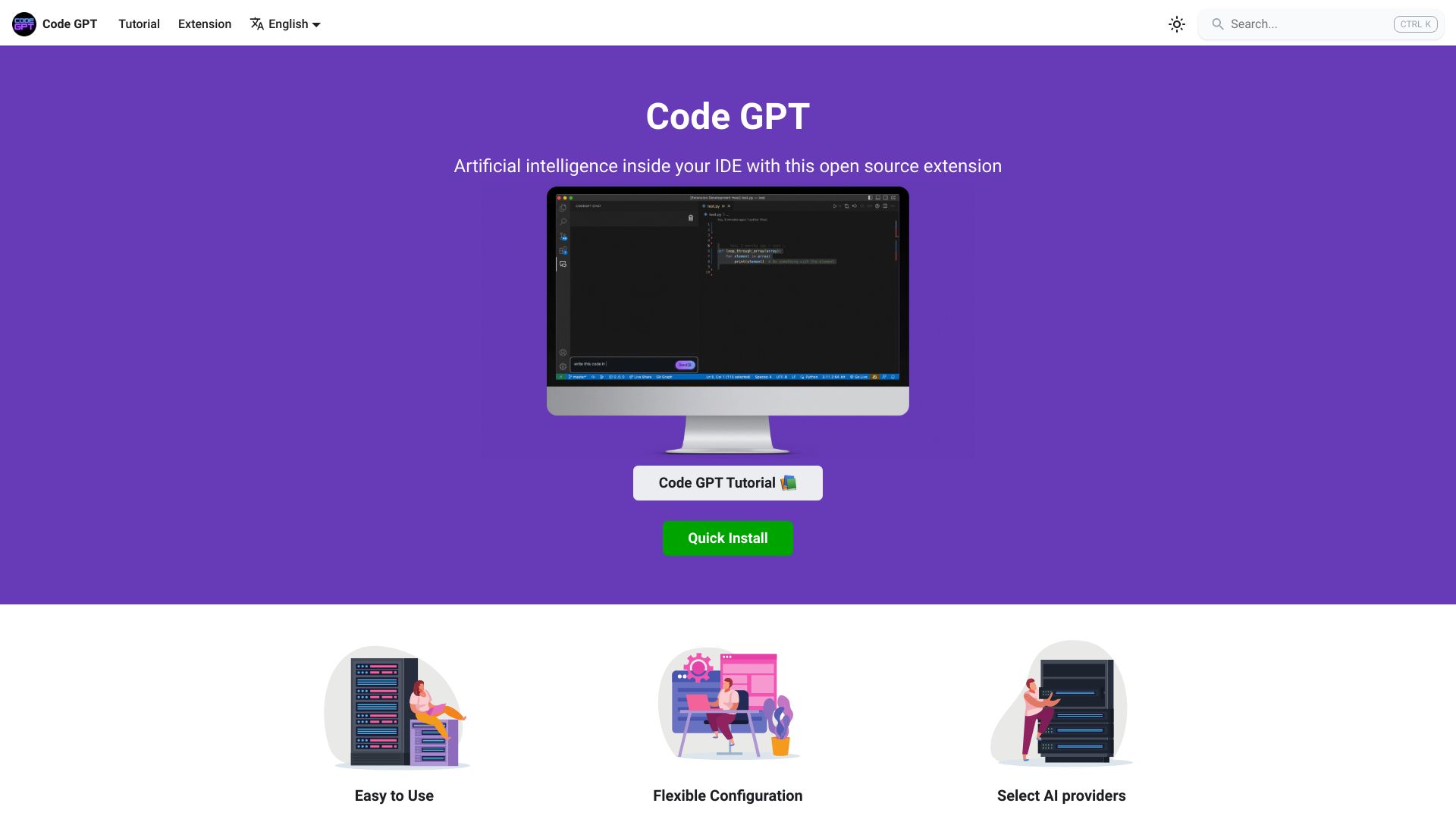
CodeGPT
Open Website-
Tool Introduction:Unfiltered adult roleplay and authentic AI companionship.
-
Inclusion Date:Oct 21, 2025
-
Social Media & Email:
Tool Information
What is CodeGPT AI
CodeGPT AI is an agentic AI platform for software development teams that goes beyond code completion. It connects to your repositories, builds a deep understanding of your codebase and docs, and orchestrates specialized agents to automate PR reviews, triage issues, and onboard developers. With an assistant creator for custom GPTs, an Agent Marketplace, a Copilot for software engineers, and an extensible API, CodeGPT AI turns repetitive engineering tasks into reliable workflows while preserving team context, security, and governance.
CodeGPT AI Main Features
- Agentic PR Reviews: Automate pull request review with context-aware feedback, suggested changes, risk flags, and compliance checks.
- Deep Codebase Understanding: Indexes repos, docs, and tickets to provide grounded answers and precise code navigation using retrieval for code and knowledge.
- Assistant Creator (Custom GPTs): Build domain-specific assistants tailored to your stack, guidelines, and workflows.
- Agent Marketplace: Deploy prebuilt agents for code review, onboarding, documentation, test generation, and support handoffs.
- Copilot for Engineers: In-IDE and chat-based help for code suggestions, refactors, explanations, and test scaffolding.
- Issue Triage & Workflows: Classify bugs, suggest owners, generate summaries, and create remediation tasks with traceable actions.
- Onboarding & Knowledge Bots: Answer “how do we…” questions with repo-aware guidance and internal standards.
- API & Integrations: Connect GitHub/GitLab/Bitbucket, CI/CD, and internal systems; extend with API and webhooks.
- Controls & Governance: Role-based access, visibility settings, audit trails, and content filters for enterprise use.
- Analytics: Track agent impact, review throughput, and cycle-time improvements.
Who Should Use CodeGPT AI
CodeGPT AI is suited for software engineers, tech leads, and engineering managers who want reliable automation for PR reviews, developer onboarding, and knowledge retrieval. DevOps and QA teams can use agents to triage issues and improve test coverage. It supports startups aiming to scale velocity, mid-size teams standardizing review quality, and enterprises seeking secure, context-aware AI across large monorepos.
How to Use CodeGPT AI
- Sign up and create a workspace for your team or organization.
- Connect source control (e.g., GitHub, GitLab, Bitbucket) and select repositories to index.
- Configure data sources such as internal docs and wikis to enrich codebase context.
- Create or install agents from the Agent Marketplace for PR review, onboarding, or support workflows.
- Use the Assistant Creator to build custom GPTs aligned with your coding standards and stack.
- Enable the Copilot in your IDE or chat to get code suggestions and explanations.
- Set policies, permissions, and visibility; define review rules and triggers in CI/CD.
- Integrate the API to embed agents into internal tools or automate bespoke workflows.
- Monitor analytics, iterate on prompts/policies, and refine agent behaviors over time.
CodeGPT AI Industry Use Cases
In SaaS engineering teams, CodeGPT AI automates pull request reviews, flags regressions, and drafts tests, reducing review backlog. Fintech teams use compliance-aware agents to check for data handling issues and enforce secure coding patterns. E-commerce companies onboard new developers faster with repo-aware knowledge bots that explain services and conventions. Open-source maintainers deploy PR triage agents to label issues, suggest owners, and provide contributor guidance.
CodeGPT AI Pricing
CodeGPT AI typically offers tiered plans for individuals, teams, and enterprises, with usage-based components for advanced features and API calls. A trial or free tier may be available to evaluate core capabilities. Marketplace agents and premium integrations can carry additional costs. For exact pricing, plan limits, and enterprise options, refer to the official product site.
CodeGPT AI Pros and Cons
Pros:
- End-to-end agentic AI workflows beyond basic code completion.
- Strong codebase context for accurate reviews, answers, and refactors.
- Accelerates PR throughput, onboarding, and documentation upkeep.
- Flexible customization via Assistant Creator, Marketplace, and API.
- Governance features suitable for larger teams and enterprises.
Cons:
- Initial setup and policy tuning are required to achieve stable results.
- Repository access and data governance need careful configuration.
- AI feedback can include false positives; human oversight remains necessary.
- Costs may scale with repository size, user seats, and API usage.
CodeGPT AI FAQs
-
Does CodeGPT AI work with monorepos?
Yes. It can index large repositories and use scoped context to keep responses relevant to specific services or directories.
-
Can I enforce coding standards and security rules?
You can define policies and prompts so agents check for conventions, risky patterns, and compliance items during PR reviews.
-
How does the Copilot differ from standard code completion?
It leverages your team’s codebase and docs, providing context-aware suggestions, explanations, and refactors tied to your stack.
-
Is there an API to build custom workflows?
Yes. The API allows integrating agents into internal tools, CI/CD workflows, and automation pipelines, with webhooks for events.




